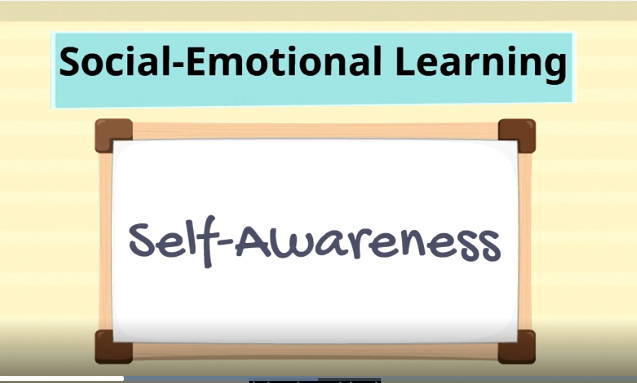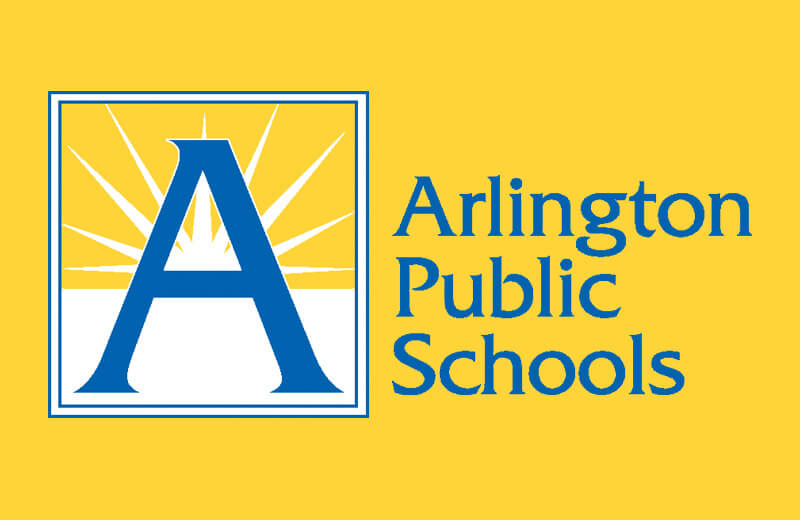SEL Focus: Self-Awareness
Self-awareness: The ability to accurately recognize one’s emotions and thoughts and their influence on behavior. This includes accurately assessing one’s strengths and limitations and possessing a well grounded sense of confidence and optimism. (CASEL, 2021).
Skills that develop self-awareness are:
- Integrating personal and social identities
- Identifying personal, cultural, and linguistic assets
- Identifying one’s emotions
- Demonstrating honesty and integrity
- Linking feelings, values, and thoughts
- Examining prejudices and biases
- Experiencing self-efficacy
- Having a growth mindset
- Developing interests and a sense of purpose
Check out this video to learn how you can help children develop self-awareness, the foundation of social-emotional learning, by teaching the vocabulary of emotions, and modeling behavior that supports self-awareness.
How Do We Develop Self-Awareness?
Self-awareness is the ability to monitor our inner and external world. Our thoughts and feelings arise as signals. Developing self-awareness allows us to keep from being swept away by those signals, and instead, objectively and thoughtfully respond to them. Self-aware people understand their internal experience and their impact on the experience of others.Ways to Increase Self-Awareness
- A thought diary is a foundational place to begin increasing self-awareness.
- Keep track of thoughts that pop up in the form of an automatic reaction.
- Track what was occurring at the time.
- Track your level of emotion to the stimulus.
SEL Practices to Build Competencies at Home
Parents are the first teachers of SEL. Time with family over Winter Break means more opportunities to teach your child the concepts and skills of Social Emotional Learning (SEL). SEL is an ongoing process & not simply a strategy to address a specific behavior or situation. Everyday interactions parents have with their children are potential opportunities to build SEL competencies.
Practice at home:
- Focus on Strengths- Helping your child identify strengths helps to build self-efficacy & the ability to persist through difficult times.
- Use Visuals for Planning- Check-lists & other visuals help children see what needs to be done to succeed, as well as experience pride as goals are met.
- Ask your child about feelings to help students build self-awareness & communication of needs.
- Stay calm when angry & model calm-down strategies. Explain to your child what you are doing & why.
- Be willing to apologize & admit when you’ve made a mistake.
- Build empathy by encouraging your child to help & share within your family & community.
Source: EdSurge
Self-Awareness and Self-Management
Please see the link below to explore how a better understanding of their own feelings and experiences can help children have better control of their actions. Parents will learn how to help their child become more aware of their emotions, their strengths and weaknesses, and what makes them an individual. That increased awareness will help them better manage their behavior and interactions with others. https://www.pbslearningmedia.org/resource/self-awareness-and-self-management-sel-video/social-emotional-learning/
APS Highlight: SEL in ACTION
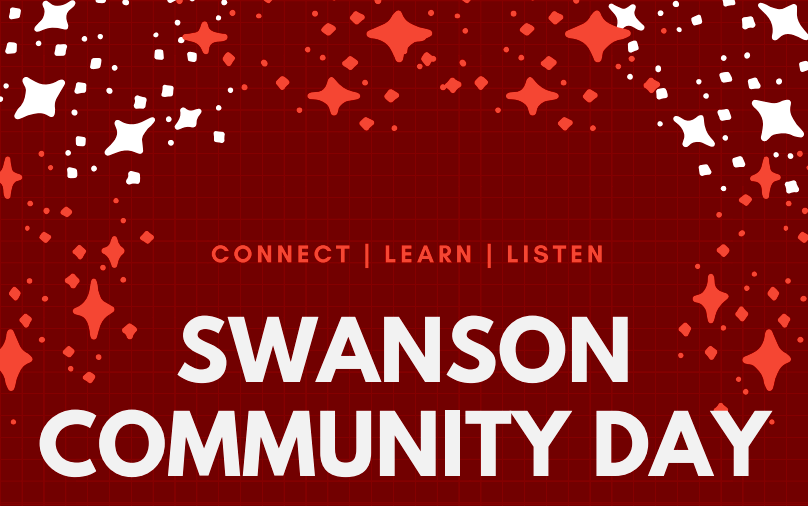
The Office of Student Services Staff coordinated the first ever Community Day at Swanson Middle School. On December 8th, all students and staff participated in a half day of learning and community building focused on communication, problem-solving, team building, and student voices. The lessons were all developed by the school counselors, school social worker, and school psychologist.
The goals of community day were to:
-
- Empower students to build skills to support social-emotional well-being, build community, build trusted adults/peers
- Support the district-wide initiative for the “whole student”
- Strengthen relationships and lessen detachment
- Develop a shared problem solving language
- Create schedules and lessons that are simple for teachers to execute
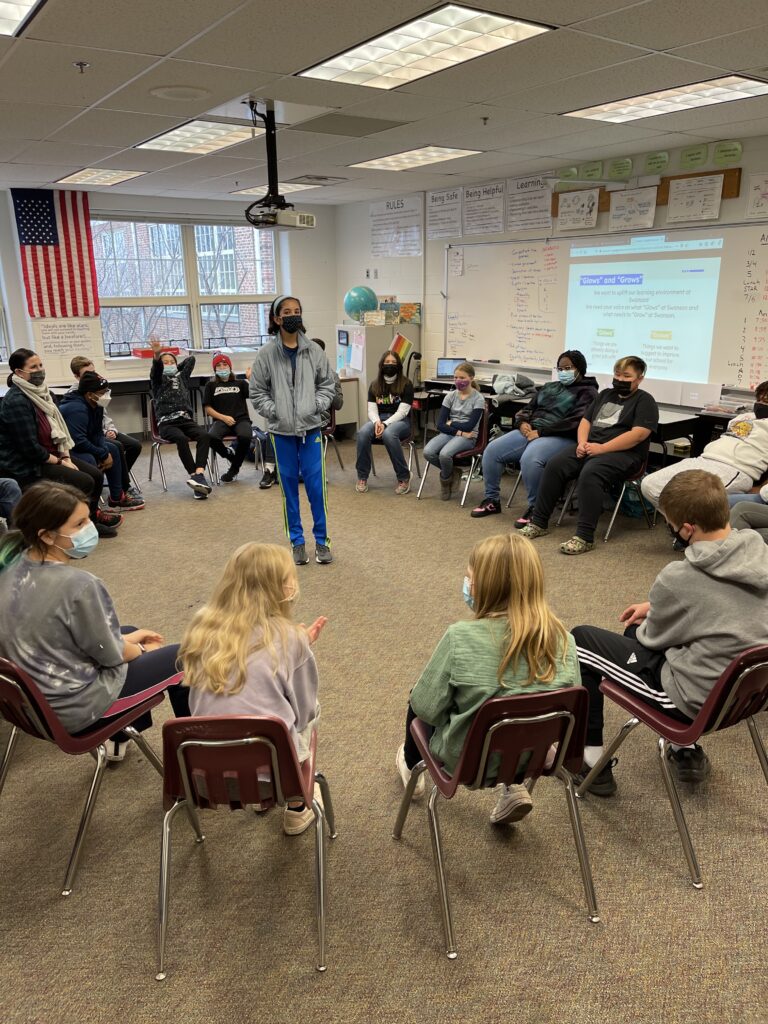

Students said they learned how to talk to each other and disagree effectively, way to calm down, how to make friends and work together, ways to listen, and how to be kind and caring to others. Students also commented that the event helped them feel that their voices were heard and they can make a difference. Staff commented that the event was well-organized and they appreciated the thoughtful planning, lessons, and activities.
National Impaired Driving Prevention Month
Each December, we go out for fun, parties and drinks with family and friends. But we ask you to stop and think for a second about being responsible. December is National Impaired Driving Prevention Month and since the holiday season has a higher accident rate than others on average, it is important to echo the message of consciousness of being in a proper state behind the wheel.
According to the National Safety Council, over 40,000 people died in alcohol-related traffic accidents last year. During the holidays, as traffic begins to build on our highways, the incident rate of accidents also increases. Sadly, these incidents often involve impaired drivers. There are 5 types of impairments to consider during this time: those that have consumed alcohol and/or drugs, fatigued drivers, distracted drivers, or someone suffering a medical emergency. During the month of December, law enforcement has consistently noted a significant increase in drinking and driving related incidents. According to the Department of Motor Vehicles in Virginia, 28 people die in drunk driving crashes every day in the U.S., or one every 51 minutes. In Virginia, 35% of all traffic fatalities involve alcohol. According to the Virginia Crime Report, there were 17,028 DUI arrests in 2020 (Virginia State Police, 2020).
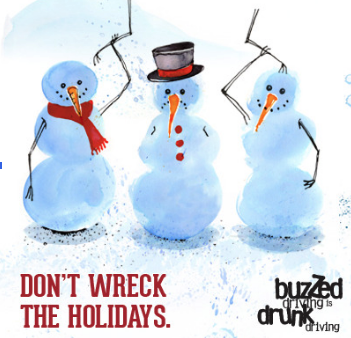 Since 1981, high officials all across America have worked their hardest promoting the importance of staying sober while driving during the month of December, proclaimed National Impaired Driving Prevention Month, and it all stemmed from one woman and her resolve.
Since 1981, high officials all across America have worked their hardest promoting the importance of staying sober while driving during the month of December, proclaimed National Impaired Driving Prevention Month, and it all stemmed from one woman and her resolve.
On May 3, 1980, thirteen-year-old Cari Lightner was struck and killed by Clarence Busch in a drunk driving accident. When police arrested Clarence, they found this was not his first occurence, even down to a hit-and-run drunk driving fine less than a week before his accident with Cari. At the time, driving while intoxicated was a misdemeanor that was barely prosecuted, meaning that Busch was very unlikely to have gone to jail.
This unacceptable fact motivated Cari’s mother, Candy Lightner, to take action. The result was the non-profit organization known as MADD, Mothers Against Drunk Driving. Candy’s movement quickly grew across the nation. She pushed for a more strict definition of what drunk driving was, having legislators pass stricter laws and prosecutions that included jail time and license suspensions, up to having President Reagan establish 21 as the minimum drinking age and appointing Lightner as part of a commission developed to tackle the issue.
As you prepare for the holidays, if you are traveling, here are some points to consider as you observe others sharing the roads with you: tailgating, weaving in and out of traffic or zigzagging across the road, almost striking an object, curb, or vehicle, stopping without cause or erratic braking, and/or drifting in and out of traffic lanes. If you see something, say something, please call or text 911 for further assistance. Let’s keep our loved ones safe during this joyous time of the year!
Mental Health Corner

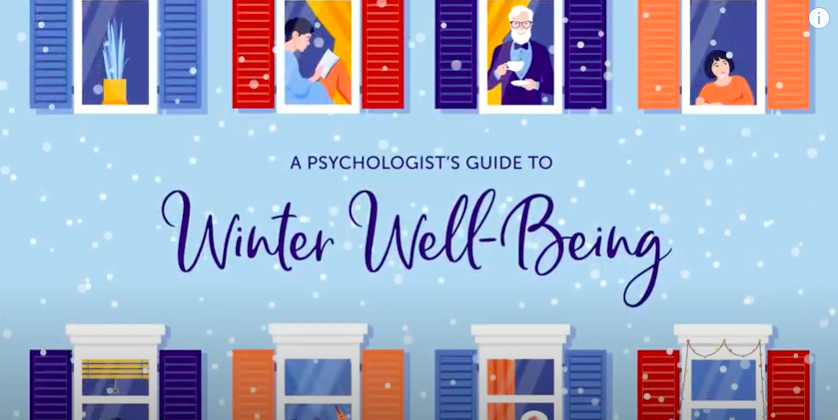 Winter Well-Being Series: “A Psychologist’s Guide to Winter Well-Being” is a therapist-led video series from Committee for Children to support parents’ mental health. The 8-week series is designed to encourage parents to prioritize their mental health as winter approaches, offering evidence-based advice and a weekly self-care prescription. All eight weekly videos feature Dr. Mylien Duong, licensed clinical psychologist and senior research scientist at Committee for Children. Dr. Duong gives viewers bite-sized self-care tips and guides them through simple practices to improve social and emotional well-being: Week 1: Self-CompassionWeek 2: Managing Holiday StressWeek 3: Being Present with FamilyWeek 4: Resolutions That StickWeek 5: Setting Your IntentionsWeek 6: Making Time for JoyWeek 7: Listening to UnderstandWeek 8: Expressing Gratitude
Winter Well-Being Series: “A Psychologist’s Guide to Winter Well-Being” is a therapist-led video series from Committee for Children to support parents’ mental health. The 8-week series is designed to encourage parents to prioritize their mental health as winter approaches, offering evidence-based advice and a weekly self-care prescription. All eight weekly videos feature Dr. Mylien Duong, licensed clinical psychologist and senior research scientist at Committee for Children. Dr. Duong gives viewers bite-sized self-care tips and guides them through simple practices to improve social and emotional well-being: Week 1: Self-CompassionWeek 2: Managing Holiday StressWeek 3: Being Present with FamilyWeek 4: Resolutions That StickWeek 5: Setting Your IntentionsWeek 6: Making Time for JoyWeek 7: Listening to UnderstandWeek 8: Expressing Gratitude
LEARN MORE: Youth Mental Health First Aid Training Available to Staff & Parents
The Office of Student Services continues to be committed to training all new staff and re-certifying staff in Youth Mental Health First Aid (YMHFA). This is a 6-hour course that teaches how to identify, understand, and respond to signs of mental illnesses and substance use disorders. Registration for staff is through Frontline. Parents can register by calling the Office of Student Services at 703-228-6062. Training will be provided every month for the remainder of the year.Upcoming session dates are: January 13, February 8, March 10, March 31, April 27, and May 10.
LEARN MORE: Did you miss Dr. Christina Choi’s Social Emotional Learning Presentation in November?
The Student Services Advisory Committee invites you to watch a recording of their meeting featuring guest speakers Dr. Christina Choi and Dr. Peck Cho. Dr. Christina Choi is an author and presenter who appears regularly on TV and was the host of a very successful TV talk show in S. Korea. She has made more than a dozen TV documentaries on marriage, parenting & education. Her TV documentary on motherhood received a Best Program award, and she was chosen as one of the three most influential women in Korea. Dr. Peck Choi is Co-Founder and Co-Director with Dr. Choi of an Institute of Resilience and Positivity, which provides workshops for professionals. The Institute offers a free educational program to hundreds of daycare center staff and parents in impoverished areas and to workers of UNICEF. They have also worked with 22,000 orphans and children at risk in Korea, Philippines, Mexico, Brazil and Guatemala. Christina and Peck will be talking about how to make Social and Emotional Learning part of the culture. The recording is online at: https://youtu.be/uXNQyjhlT5w
LEARN MORE: What can YOU do to prevent child abuse?
Darkness to Light is a Nation-Wide prevention and awareness program that empowers adults to prevent child abuse. The Arlington County Child Advocacy Center is hosting training sessions that are a part of the “Darkness to Light” program and are open to the public. Multiple trainings are available in either English or Spanish.
- Stewards of Children (2 ½ hours)- Learn how to prevent, recognize, and react responsibly to child sexual abuse.
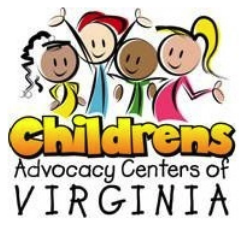
- Healthy Touching (1 hour)- Learn how to balance children’s needs for warmth and affection with safe, respectful ways of interacting.
- Talking with Children about Safety from Sexual Abuse (1 hour)- Learn to have age-appropriate, open conversations about our bodies, sex, and boundaries.
- Bystanders Protecting Children from Boundary Violations and Sexual Abuse (1 hour)- Learn to describe behavior. Set limits. Move on. Always make sure the person who has violated the boundary is willing to follow the limit you set.
- Commercial Sexual Exploitation of Children (I hour)- Learn about commercial sexual exploitation, which is a form of sexual abuse and should not be mistaken for as child’s consent.
Darkness to Light training sessions can also be scheduled and tailored for professional/ community groups on other dates and times.To register for or discuss scheduling any of these Darkness to Light trainings go to https://www.signupgenius.com/go/20F0A45ACA829A6FD0-stewards1.Contact Jennifer Gross at 703-228-1561 or [email protected] for more information.
Resources: CIGNA School Support Line – OPEN TO ALL
Don’t do it alone. There are many reasons to seek help. Some are common, others more serious. Either way, talk with us today if you or a family member are dealing with: Anxiety, Depression, Abuse, Eating disorders, Bullying, Self-harm, Addiction, Peer Pressure, Suicidal thoughts or anything else. No one has to be a Cigna customer to call. If you go to school, or have a child who goes to school, the School Support Line was created for you.This is a no-cost, confidential service that puts students and families in touch with mental health professionals who know how to listen, ask the right questions, and offer advice. And it’s available around the clock for you and for members of your family. 833-MeCigna (833-632-4462) We’re here 24/7/365!
- School Support Line Spanish
- School Support Line Amharic
- School Support Line Arabic
- School Support Line Mongolian
- School Support Line English
 Contact
Contact  Calendars
Calendars Careers
Careers Engage
Engage  District
District
